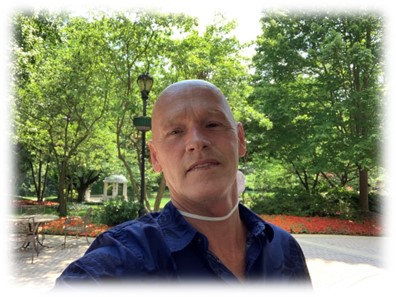GCAB Co-Chair
Christopher Tunstall has been involved with HIV research for nine years, but he’s been an HIV advocate for almost 40. He currently serves as the Co-Chair of ACTG’s global community advisory board (GCAB), which he has been a part of since 2020, after a year serving on the CAB at the University of North Carolina (UNC) at Chapel Hill. His kindness and thoughtfulness are standout features of his leadership, as is his commitment to HIV cure research.
“I’ve been a participant in three phase 1 HIV cure trials at UNC,” said Christopher. “My role, as I define it, is to ‘be a voice for the unspoken.’ I say this because HIV/AIDS is stigmatized around the world and that stigma leads to heinous acts and violence towards LGBTQ+ people for just being themselves. I use my voice for those who can’t always use their own.”
Christopher’s personal journey informs his advocacy. Diagnosed with HIV in late 2013, he was in the hospital only a few months later with AIDS. “My first thought was ‘Who is going to take care of mom and dad?’ Nothing else mattered to me. Despite the physical, mental, emotional and spiritual toll AIDS was taking on my body and psyche, by the grace of God, my refusal to give up, resolute conviction, and effective therapies created by ACTG, I was able to care for my parents 24/7 like they did for me from childbirth to adolescence and into adulthood.”
After Christopher started treatment, he became undetectable within just a few months. “If it had not been for the groundbreaking research of the ACTG over the past four decades, I would not be alive today. And, I would have been robbed of taking care of my parents during their time of need up until to their final days.”
Christopher credits ACTG and other research organizations with changing the course of the HIV epidemic. “Not a day goes by that I don’t think about one too many of my best friends, my second family, valiantly fighting against their AIDS diagnosis on a daily basis during the early years of the epidemic. It was a living nightmare! And it was life changing for me. If it was not for ACTG and grassroot efforts across the country, millions more would have died sooner.”
He’s very concerned about the current state of funding for HIV research and the ways in which reduced funding have the potential to turn the clock back on the successes of HIV research. “I’m worried that we’re going to be back to where we were decades ago when HIV was a death sentence.”
He argues that the world will suffer if ACTG does not regain its full funding, allowing it to continue to advance research for HIV, TB, hepatitis, and emerging pathogens. “I lost my oldest brother to COVID-19 three months before he was going to retire and enjoy his ‘Golden Years.’ Instead, my sister and I were mourning the loss of an honorable, loving brother. I do not want anyone to experience these kinds of immense losses.”
Even in the midst of times as challenging as these, Christopher remains steadfast in his positivity and his commitment to advocacy and research. “We will not stop until there is a vaccine and cure for HIV for everyone, regardless of their geography, ethnicity, gender identify, and socioeconomic level.”
